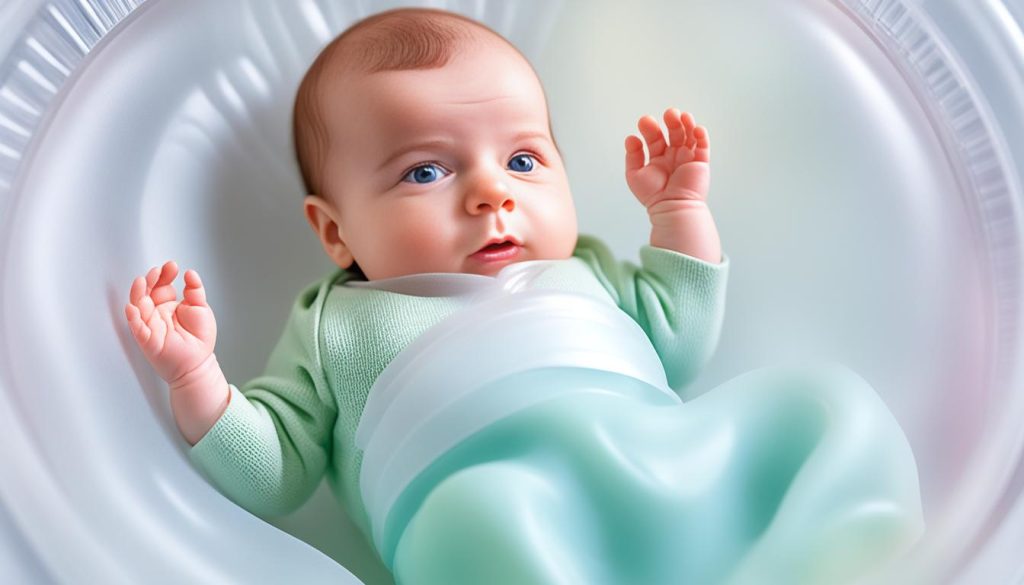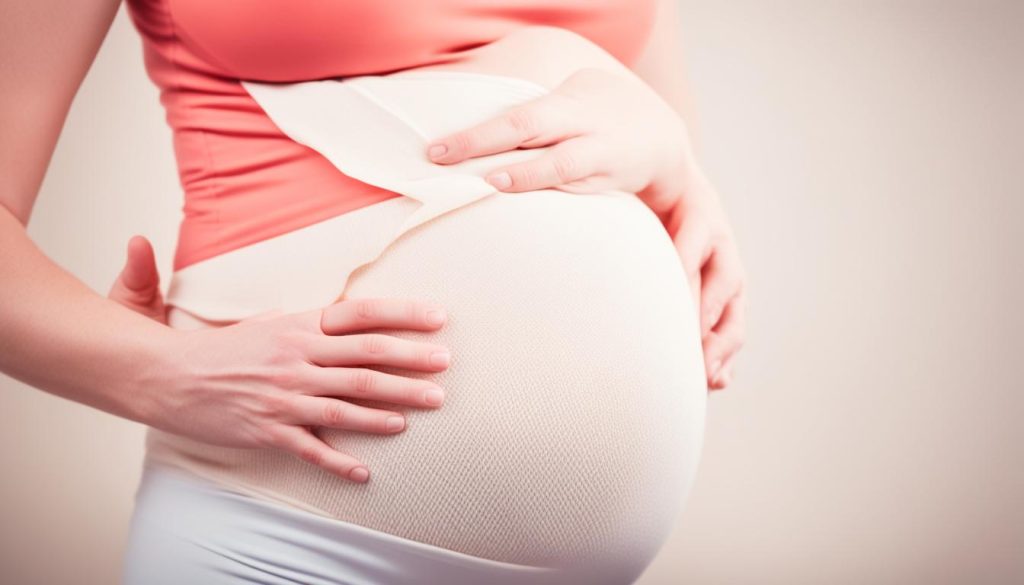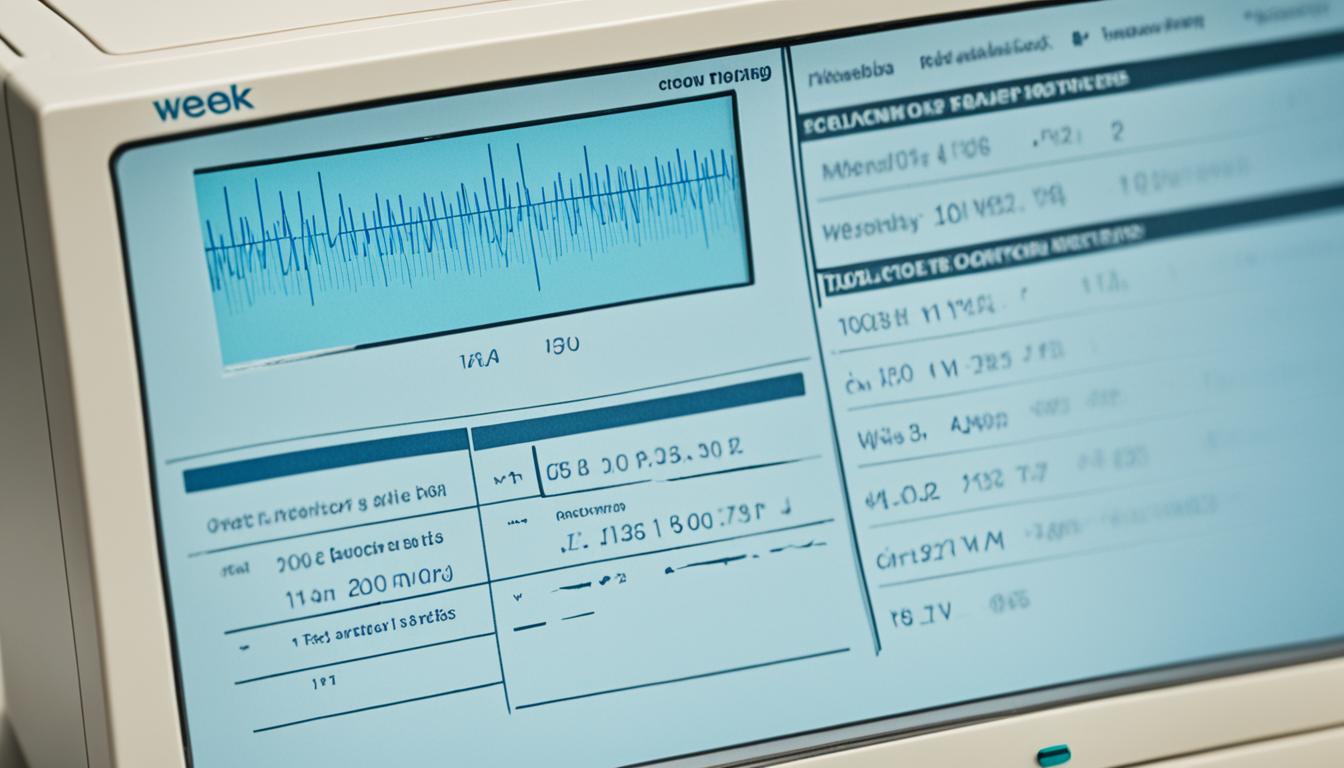At 15 weeks, you may have concerns about your baby’s well-being and health. It’s completely normal to want reassurance and guidance during this stage of pregnancy. In this article, we will explore the signs of a healthy baby at 15 weeks, monitoring baby health, and baby milestones you can expect.
During this stage of pregnancy, your baby’s development is progressing rapidly. They are starting to develop their senses, with their hearing becoming more refined. They may be able to hear sounds from outside the uterus, including your voice. Their eyes are also becoming sensitive to light, even though they remain closed.
You may be experiencing some common pregnancy symptoms such as increased vaginal discharge and backache. While these are normal, it’s essential to be aware of any abnormal changes that could indicate an infection or other complications.
To monitor your baby’s health and ensure their well-being, it’s crucial to consult with your midwife or healthcare provider. They can provide reassurance and guidance based on your individual circumstances. Regular prenatal check-ups, ultrasounds, and tracking your baby’s movements can also help you feel more confident about your baby’s development.
If you have any questions or concerns about your baby’s health at 15 weeks, it’s vital to reach out to your healthcare provider. Remember, every pregnancy is unique, and seeking professional guidance can provide you with the peace of mind you need during this exciting time.
How Do I Know My Baby is Ok at 15 Weeks?
At 15 weeks, your baby’s development is progressing rapidly. Here are some key milestones in their growth:
| Development | Details |
|---|---|
| Hearing | Your baby is starting to hear sounds from the outside world. They may be able to hear your voice, heartbeat, and even noises from your digestive system. |
| Eye Sensitivity to Light | Although their eyes are still closed, your baby’s eyes are becoming sensitive to light. They are developing the ability to perceive changes in brightness. |
| Skeletal System | Their skeletal system is starting to ossify, which means their bones are becoming denser and harder. |
| Movement and Reflexes | Your baby is practicing various movements and reflexes that are important for their survival outside the womb. These include breathing motions, sucking motions, and swallowing motions. |
| Ears and Eyes | Their ears and eyes are moving to their proper positions on their face. |
This is an exciting time as your baby continues to grow and develop in preparation for their arrival.

Monitoring Baby Health at 15 Weeks?
It is natural to have concerns about your baby’s health at 15 weeks. Monitoring their well-being can provide reassurance and peace of mind.
One positive sign that your baby is doing well is feeling their movements. While it may be too early to feel distinct kicks, you may start to notice flutters or gentle movements as your baby becomes more active. Feeling your baby’s movements is a great way to bond and connect with them during this special time.
It’s important to be aware of your baby’s individual patterns of movement. Every baby is unique, and their movement patterns may differ. Some babies are more active during certain times of the day, while others may have more frequent movements throughout the day.
If you have any concerns or notice a significant decrease in movement, it’s essential to consult with your healthcare provider. They can provide guidance and perform additional tests, such as ultrasounds or fetal heart rate monitoring, to ensure your baby’s overall health and development.
Regular prenatal check-ups are also crucial for monitoring your baby’s well-being at 15 weeks. These check-ups allow your healthcare provider to assess your baby’s growth, listen to their heartbeat, and address any concerns or questions you may have.
Remember, every pregnancy is unique, and it’s normal to have questions and concerns. Trust your instincts and reach out to your healthcare provider for any reassurance or guidance you need on your journey to becoming a parent.

| Signs of a Healthy Pregnancy at 15 Weeks | How Do I Know if My Baby is Moving at 15 Weeks? |
|---|---|
| Consistent weight gain | Feeling flutters or gentle movements |
| Healthy appetite | Noticing your baby’s individual movement patterns |
| Absence of severe pain or discomfort | Consulting with your healthcare provider if you have concerns or notice a significant decrease in movement |
| Normal blood pressure | Regular prenatal check-ups, ultrasounds, and fetal heart rate monitoring |
| Stable hormonal levels | Trusting your instincts and seeking guidance from your healthcare provider |
Signs of a Healthy Pregnancy at 15 Weeks
While every pregnancy is unique, there are certain signs that can indicate a healthy pregnancy at 15 weeks. It’s important to be aware of these signs to ensure your baby’s well-being and your own peace of mind.
1. Consistent Weight Gain
At 15 weeks, it’s normal to experience weight gain as your baby continues to grow. A healthy weight gain during pregnancy is usually around 1-2 pounds per week. However, it’s essential to maintain a balanced diet and consult with your healthcare provider for personalized guidance.
2. Healthy Appetite
A healthy pregnancy is often accompanied by a good appetite. Feeling hungry and having regular meals is a positive sign that your body is nourishing your baby. However, if you have any concerns about your appetite or significant changes in your eating patterns, it’s advisable to reach out to your healthcare provider.
3. Absence of Severe Pain or Discomfort
While some discomfort is normal during pregnancy, severe or persistent pain should be addressed with your healthcare provider. If you experience any unusual pain, cramping, or sharp abdominal discomfort, it’s crucial to seek medical advice to rule out any underlying issues.
4. Normal Blood Pressure
Monitoring your blood pressure is essential throughout your pregnancy. Normal blood pressure ranges around 120/80 mmHg. Consistently high or low blood pressure can indicate potential complications, so it’s important to have regular check-ups with your healthcare provider to ensure your blood pressure remains within a healthy range.
5. Stable Hormonal Levels
Hormonal changes are a natural part of pregnancy. However, significant fluctuations or imbalances in hormonal levels can be a cause for concern. Consistent hormonal stability is important for your well-being and the healthy development of your baby. Regular prenatal visits and consultations with your healthcare provider can help monitor your hormonal levels.
If you’re not experiencing the typical symptoms of pregnancy at 15 weeks, such as morning sickness or breast tenderness, don’t worry. Every woman’s experience is different, and it’s perfectly normal to not feel pregnant at this stage. However, if you have any concerns or unusual symptoms, it’s important to consult with your healthcare provider for proper evaluation and guidance.
Remember, taking care of your health and seeking professional support plays a crucial role in ensuring a healthy pregnancy. Your healthcare provider is there to address your concerns, monitor your baby’s development, and guide you through this amazing journey.

Baby Movement at 15 Weeks
Feeling your baby’s movements is an exciting milestone in pregnancy. While it may be too early to feel distinct kicks at 15 weeks, you may start to notice flutters or gentle movements as your baby becomes more active.
The best position to feel these movements may vary for each person, but lying on your side with your knees bent and placing your hand on your abdomen can increase your chances of sensing the subtle movements.
It’s important to remember that every pregnancy is different, and it may take some time before you can consistently feel your baby’s movements. Don’t worry if you don’t feel anything yet; your baby is still growing and developing.
If you have any concerns or questions about your baby’s movement, consult with your healthcare provider for further guidance and reassurance.

Best Position to Feel Baby Move at 15 Weeks:
| Position | Advantages | Disadvantages |
|---|---|---|
| Lying on your side with knees bent |
|
|
| Sitting or standing |
|
|
| Reclining on your back |
|
|
Conclusion
At 15 weeks, your baby’s growth and development are in full swing, bringing you joy and anticipation. The increased movement and developmental milestones are positive signs of your baby’s well-being. To ensure the continued health of your baby, make sure to attend regular prenatal check-ups and openly discuss any concerns or questions with your healthcare provider. Remember, every pregnancy journey is unique, so seek professional guidance if you have any doubts or worries. Embrace this exciting stage of pregnancy as you bond with your growing baby and prepare for the beautiful journey ahead.
FAQ
1. How is my baby developing at 15 weeks?
At 15 weeks, your baby’s hearing is developing, and their eyes are becoming sensitive to light. They are also practicing various movements and reflexes necessary for survival outside the womb.
2. How can I monitor my baby’s health at 15 weeks?
One positive sign is feeling your baby’s movements. Regular prenatal check-ups, ultrasounds, and fetal heart rate monitoring can also provide valuable information about your baby’s overall health and development.
3. What are signs of a healthy pregnancy at 15 weeks?
Some signs of a healthy pregnancy include consistent weight gain, a healthy appetite, absence of severe pain or discomfort, and normal blood pressure. However, it’s important to consult with your healthcare provider if you have any concerns.
4. How will I know if my baby is moving at 15 weeks?
While it may be too early to feel distinct kicks, you may start to notice flutters or gentle movements as your baby becomes more active. Lying on your side with your knees bent and placing your hand on your abdomen can increase your chances of feeling these movements.




